Project News
2017-11-14
Summary of Side events in COP23 in Bonn
SPI-NAMA Project team participated to UNFCCC's COP23 from 7th to 14th November 2017 and organized and co-hold side events about the key negotiation topics at COP23 2017 in order to internationally share the outcomes of the Project activities within the COP participants and promote mutual learning for the Project's counterparts.
MONRE presented its national efforts in the development of upstream mitigation action policies including NDC while the Climate Change Bureau, Department of Natural Resources and Environment (DONRE/CCB) of HCMC introduced the results of technical capacity building at city-level.
Through the commitment of the counterparts and the discussions at the side events, the counterparts' ownership and the presentation and discussion capacity were more and more strengthen. Moreover, the remarkable results through the support of JICA were actively shared and publicized in this international conference.
In this COP23, SPI-NAMA organized and hold the side events related to the following topics:
- Southeast Asia Regional Dialogue - National efforts for NDC readiness formulation and its practical lessons (Co-organized by JICA Vietnam Office and MONRE)
- Suggestion to the capacity building on GHG inventory development in developing countries: Toward the Transparency Framework (Organized by JICA Headquarter)
- Southeast Asia Regional Dialogue - Lesson from efforts on strengthening technical capacities for climate change planning and implementation in Major cities (Co-organized by JICA, C40 and ICLEI)
SIDE EVENT 1 Southeast Asia Regional Dialogue - National Efforts for NDC Readiness Formulation and Its Practical Lessons (10th November 2017)
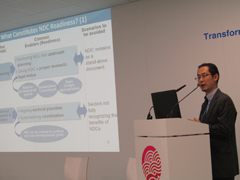 Framing lecture by SPI-NAMA Project Long-term expert Chief Technical Advisor
Framing lecture by SPI-NAMA Project Long-term expert Chief Technical Advisor
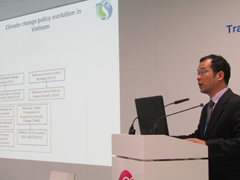 Presentation about the progress of national efforts by the counterpart at Vietnam side
Presentation about the progress of national efforts by the counterpart at Vietnam side
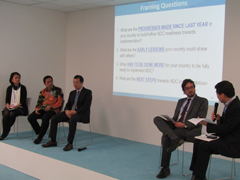 During the discussion session on the issues in each Southeast Asian Country
During the discussion session on the issues in each Southeast Asian Country
After the effectuation of the Paris Agreement and moving to the transition term for the conference of parties' domestic preparation for NDC implementation, this session aimed to share the progress of national efforts for transition to NDC implementation phase among Thailand, Indonesia and Vietnam, which are the major industrializing economies in Southeast Asia, including an international initiative "NDC Partnership" (NDCP), extract the practical issues and lessons observed from the progress, and to learn mutually among the countries.
Firstly, the framing lecture by SPI-NAMA presented the qualification and specific approach to fulfill the needs of mainstreaming, system development, securing resources, information data setup and monitoring, which have been observed as the common needs of NDC prioritization in the developing countries.
In following presentations from each country, it was confirmed that every country has appropriately made their national efforts to pledge the effectiveness of NDC in proactively aiming the launch of the next framework under the Paris Agreement. For example, Thailand has promoted the development and approval of NDC mitigation Roadmap, and Indonesia has developed the new action plan (RAN-GRK), the low carbon development planning and the operation of the online monitoring evaluation and reporting (ME&R) system while Vietnam has proceeded to the national legalization arrangement liking NDC to the GHG emitter's responsibility.
During the overall discussion session, NDCP shared the lessons extracted from the discussions among 62 member states, such as the importance of comprehensive involvement of domestic stakeholders including non-state actors, effort toward the mainstreaming, exit from sectors' vertical structure in tradition, linkage with SDGs, and multidisciplinary learning.
Meanwhile, the countries have faced the challenge in the process of realization of NDC in terms of system, capacity and technology (of the guideline for GHG emitter in particular). As the next step within the countries, Thailand emphasized the further development of sectoral action plan based on the NDC Roadmap and each sector's detailed countermeasures, and Indonesia focused on the importance of guideline development to pledge the NDC realization.
SIDE EVENT 2
Suggestion to the capacity building on GHG inventory development in developing countries: Toward the Transparency Framework (11th November, 2017)
This side event consisted of the lecture session by JICA and the Ministry of Environment of Japan and the panel discussion session. The lecture by the JICA Headquarter explained the purpose of GHG inventory according to the mitigation action plan, and the importance of developing countries' independent and continuous development and organization of domestic system and capacity building for individuals, and questioned the future support for these sectors by the international donors including JICA.
Furthermore, the JICA's technical cooperation in Vietnam, Mongol and Papua New Guinea were introduced as examples to share the lesson of the continuous support in the improvement of domestic statistic system benefiting the whole government's administration as a result. The Ministry of Environment of Japan presented another example of the inventory improvement workshop in Asia region (WGIA). During the panel discussion session, judgement of validity of indicators was shared as a challenge each country faces.
SIDE EVENT 3
Southeast Asia Regional Dialogue - Lesson from efforts on strengthening technical capacities for climate change planning and implementation in Major cities (13th November, 2017)
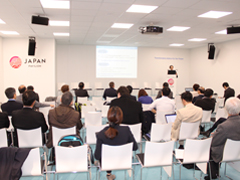 Framing lecture by SPI-NAMA Project Long-term expert Chief Technical Advisor
Framing lecture by SPI-NAMA Project Long-term expert Chief Technical Advisor
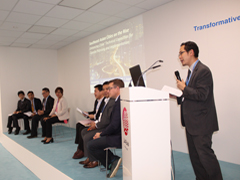 Opinion exchange during the panel discussion session
Opinion exchange during the panel discussion session
This regional dialogue aimed to invite particularly the cities promoting climate change measures and the major city-level supporting partners, and share the existing efforts and experiences on establishment of technology platform enabling the effective promotion of climate change actions.
At first, C40 emphasized that its support in urban city action plan development along the Paris Agreement would be increased by the newly obtained budget due to the GPC becoming the international standard of calculation and monitoring of GHG emission at city level. ICLEI Southeast Asia Office implied the cities' efforts on climate change already started in the region since early 2000 apart from the efforts at national level, and introduced its multi support program currently developed in the region.
Framing lecture by SPI-NAMA Project pointed that, in particular, calculation and reporting of GHG emission, city-level policy framework (action plan) and monitoring framework (MRV) were the crucial factors for technology platform, which enable the cities to implement the climate change actions. During the presentations by the invited cities, Iskandar (Malaysia) explained that the process of low carbon blueprint development itself was innovative in the country with the remarkable help of the Prime Minister for pledging the climate change actions, and introduced the CASBEE of the Iskandar version as the example of system transfer and adaptation from the cities in developed countries. HCMC (Vietnam) introduced that the development of climate change action plan in the city, inventory and MRV system have progressed under the JICA technical cooperation while Pasig (Philippines) emphasized its development of action plan and the importance of selection of technology for the national level guidance and action plan.
Department of Environment of Tokyo Metropolis shared the experiences in transition of reporting system for buildings as a main source of emission. At the panel discussion session, the participants exchanged their opinions on relation between national and local level countermeasures, future step based on the current gap, and stepwise transition from voluntary to mandatory basis in reporting system.
- About JICA
- News & Features
- Countries & Regions
- Our Work
- Thematic Issues
- Types of Assistance
- Partnerships with Other Development Partners
- Climate Change / Environmental and Social Considerations
- Evaluations
- Compliance and Anti-corruption
- Science and Technology Cooperation on Global Issues
- Research
- JICA Development Studies Program / JICA Chair
- Support for the Acceptance of Foreign HRs / Multicultural and Inclusive Community
- Publications
- Investor Relations
